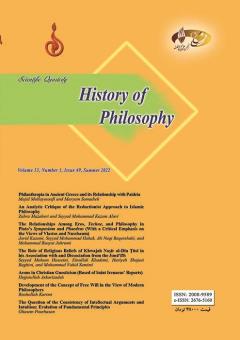Philanthropia in Ancient Greece and its Relationship with Paideia
Subject Areas : New findings regarding the development of ancient western philosophy (Greek and Hellenistic Philosophies)
Majid Mollayousefi
1
,
Maryam Samadieh
2
*
![]()
1 - Associate Professor, Islamic Philosophy and Wisdom Department, Faculty of Islamic Sciences and Research, Imam Khomeini International University, Qazvin, Iran,
2 - Assistant Professor, Department of Islamic Teachings, Faculty of Human Sciences, University of Maragheh, Maragheh, Iran
Keywords: Philanthropia, philanthropy, Paideia, education, ancient Greece, Plato, Aristotle,
Abstract :
The present paper investigates the relationship between philanthropia and paideia based on the texts of classical Greece. The term “philanthropia” was first used in a play called Prometheus Bound by Aeschylus and was later used repeatedly in some of the literary and philosophical works of the Classical Greece. In this play, philanthropy has been attributed to Prometheus because he stole fire from Zeus to give it to human beings and save them from destruction. In the comedy Peace by Aristophanes, the god Hermes has been introduced as philanthropist because he makes it possible for the humankind to access peace. In Isocrates’ speech, the term philanthropist is applied to political leaders and people who posses the highest level of virtues and share such gifts as knowledge with others. Moreover, in the fourth book of Laws, Plato introduces Cronos a philanthropist because, during his reign, he tried to consolidate the pillars of culture and civilization in society. In the dialogue Euthyphro, Socrates considers himself to be a philanthropist because he shares his knowledge with others. As attested by Aristotle, philanthropia is an essential and intrinsic quality; however, it develops a knowledge-based form through paideia. On the other hand, those existents who are called philanthropists try to develop paideia and spread it in their society.
آیسخولوس (1398) مجموعه آثار، ترجمه عبدالله کوثری، تهران: نشر نی.
افلاطون (1384) دوره آثار افلاطون، ترجمة محمدحسن لطفی و رضا کاویانی، تهران: خوارزمی.
صمدیه، مریم؛ ملایوسفی، مجید (1398) «تفسیر هایدگر از فرونسیس و رابطة آن با آگاثون (ایده خیر)»، پژوهشهای فلسفی، سال 11، شمارة 29، ص316ـ 299.
ضیمران، محمد (1390) افلاطون، پایدیا و مدرنیته، تهران: نشر نقش جهان.
فتحی، حسن؛ فانی ثانی، محمدمهدی (1400) «آلثیا، الهۀ شعر پارمنیدس: بررسی تحلیل هایدگر از حقیقت در یونان باستان»، متافیزیک، سال 13، شمارة 31، ص72 ـ51.
لائرتیوس، دیوگنس (1387) فیلسوفان یونان، ترجمة بهراد رحمانی، تهران: نشر مرکز.
یگر، ورنر (1376) پایدِیا، ترجمه محمدحسن لطفی، تهران: خوارزمی.
Aeschylus, (1926). Aeschylus, with an English trans. by H. Weir Smyth, London: Heinemann.
Aristophanes, (1907). Aristophanes Comoediae, ed. F.W. Hall and W.M. Geldart, vol. 1. Oxford. Clarendon Press.
Aristophanes, (1938). Peace. ed. Eugene O'Neill, Jr., vol. 2., New York. Random House.
Aristotle, (1831). Aristotle's Opera, ed. I. Bekker, vol. 2. Berlin. Reimer.
Aristotle, (1894). Aristotle's Ethica Nicomachea. ed. J. Bywater. Oxford. Clarendon Press.
Aristotle, (1932). Aristotle. vol. 23. trans. by W.H. Fyfe. Cambridge. Harvard University Press.
Aristotle, (1944). Aristotle. vol. 21, trans. by H. Rackham. Cambridge. MA, Harvard University Press.
Aristotle, (1952). Aristotle. vol. 20. trans. by H. Rackham. Cambridge. Harvard University Press.
Aristotle, (1957). Aristotle, Politica. Oxford. Clarendon Press.
Aristotle, (2004). Nicomachean Ethics, trans. and ed. by R. Crisp, Cambridge University Press.
D'Angour, A., (2013). Plato and play: Taking education seriously in ancient Greece. American Journal of Play, vol. 5, no. 3, pp. 293-307.
Demosthenes, (1903). Demosthenis Orationes. ed. S. H. Butcher. Oxonii.e Typographeo Clarendoniano.
Demosthenes, (1926). Demosthenes. with an English trans. by C. A. Vince, J. H. Vince, Cambridge. Harvard University Press.
Demosthenes, (1931). Demosthenis Orationes. ed. W. Rennie. Oxonii.e Typographeo Clarendoniano.
Demosthenes, (1949). Demosthenes. with an English trans. by N. W. DeWitt, and N. J. DeWitt. Cambridge. Harvard University Press.
Ferguson, J., (2017). Moral values in the ancient world. vol. 3, NewYork. Routledge.
Haegemans, K. (2001). Character drawing in Menander's Dyskolos: Misanthropy and Philanthropy. mnemosyne: 675-696.
Heidegger, M., (1998). On the essence of truth. in Pathmarks. ed. by William McNeill, Cambridge University Press.
Isocrates, (1980). Isocrates. with an English tran. by G. Norlin, Cambridge. Harvard University Press.
Jaeger, W., (1947). Paideia, the Ideals of Greek Culture. in Search of the Divine Center, vol. 2. trans. from the German Manuscript by G. Highet. Oxford. Blackwell.
Laertius, D., (1925). Lives of Eminent Philosophers. vol. 1 (books 1-5). Loeb Classical Library, Cambridge. Harvard University Press.
Nikolaidis, A. (2009). Philanthropia as sociability and Plutarch’s unsociable heroes. in Jose Ribeiro Ferreira and Del¬m Leao (eds.). Symposion and Philanthropia in Plutarch. Coimbra University Press. pp.275-288.
Plato, (1903). Platonis Opera. ed. J. Burnet. Oxford University Press.
Plato, (1925). Plato. in Twelve Volumes. vol. 9. trans. by H. N. Fowler. Cambridge. Harvard University Press.
Plato, (1966). Plato. in Twelve Volumes. vol. 1 trans. by H. North Fowler. Introduction by W.R.M. Lamb. Cambridge. Harvard University Press.
Plato, (1967). Plato. in Twelve Volumes. vol. 10. trans. by R.G. Bury. Cambridge. Harvard University Press.
Snyder, J. T., (2012). Reading Plato with Heidegger: a study of the Allegory of the Cave. Doctoral dissertation, Kent State University.
Sulek, M., (2010). On the classical meaning of philanthrôpía. Nonprofit and voluntary sector quarterly, vol. 39. No. 3: pp. 385-408.
Xenophon, (1910). Xenophontis opera omnia. vol. 4. Oxford. Clarendon Press.
Xenophon, (1914). Xenophon. in Seven Volumes. vols. 5 and 6. trans. by Walter Miller. Cambridge. Harvard University Press.

